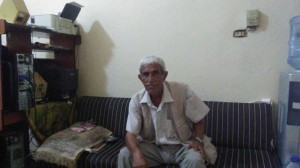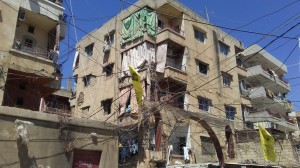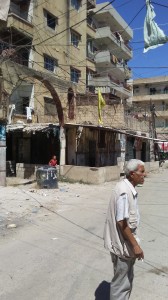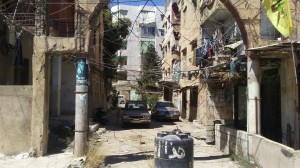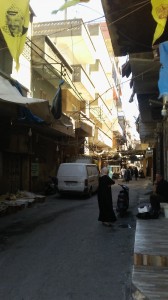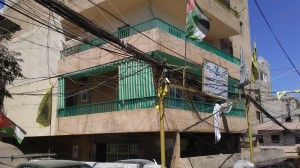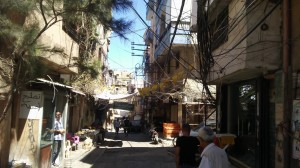Despite the attention the recent influx of Syrian refugees receives in ‘Western’ media, many may be surprised to know that Lebanon, a small country (10,452 km2 [4,036 sq mi], smaller than the U.S. state of Connecticut) of around 6 million people (slightly larger than the population of the U.S. state of Maryland), hosts the second largest population of refugees worldwide (behind Pakistan[1]), and has the highest density of refugees-to-host population. But this is not a recent phenomenon. In fact, there are some refugees who have been in Lebanon for over half a century.
Administrative office within the Beddawi Palestinian Camp near Tripoli
The population of Palestinian refugees in Lebanon is estimated at around 450,000, which is around 10% of the total population, although accurate demographic information is difficult to find for Lebanon in general given that, for political reasons, there has not been an official census since 1932. The earliest arrivals date back to 1948 following the First Arab-Israeli War, but they have continued to come, some even two-time refugees – having fled originally to Syria, and now being forced to Lebanon as a result of the conflict there.
In Lebanon, Palestinians live in a number of designated camps throughout the country. These camps are run completely independent of the Lebanese government and, in coordination with the Palestinian Authority, are responsible for the organization and security of the camps. Since 2013 Peace Labs has been involved in projects in the Beddawi camp, near Tripoli, and during my summer internship I had the opportunity to speak with Abu Rami, who is in charge of providing services in the camp. In addition to working with the Peace Labs program, Abu Rami does social reconciliation work in conjunction with various popular entities, social groups, and NGOs working in the camp.
Abu Rami in his office
Abu Rami was born in 1953 in Tripoli, Lebanon, to parents from northern Palestine. In 1968, he joined the Palestinian military organization which polices the camps, and eventually went to study in Bulgaria as part of a program organized by the Palestinian Liberation Organization (PLO), which sent groups of Palestinians to study abroad in order to later return and transfer their knowledge to help improve the situation of the Palestinians.
Having studied psychology and business in Bulgaria, Abu Rami joined the popular committee upon his return. Within the Palestinian camps, there are three governmental structures: the head office, which communicates/coordinates with the Lebanese government; the popular committees, which serve as the governing structure for the camps; and the Palestinian security force, which acts as a police force for the camps, as well as connecting to the Lebanese military in case there are any serious problems in the camps.
The role of the popular committee is to help the people and provide services, such as water, electricity, health, education, and sanitation. As part of the popular committee, Abu Rami oversees service provision, and has also been involved in a number of other activities: serving as an organizer and working in the archives, running a sports club within the camp, communicating among organizations inside and outside the camp, and dealing with legal issues related to refugees, particularly the status of children. He was also in charge of the refugees who fled northward after the Israeli invasion and occupation of southern Lebanon in 1982, and, more recently, he is responsible for following up with the approximately one thousand families of refugees from Syria who have moved into the camp.
Work in Beddawi poses various challenges. The camp was built in 1957 in a 1km2 area provided for the United Nations Relief and Works Agency (UNRWA), which is responsible for supporting Palestinian refugees, and was originally intended for 17,500 people. Today, the camp holds upwards of 50,000 people, but its geographic area has not expanded along with the population growth because Palestinians are legally barred from owning property in Lebanon outside of the designated camps. This is a major challenge for Beddawi, as Palestinians from 1967, and later those who fled southern Lebanon in 1982, joined those from 1948 who were already living in the camp. Furthermore, Syrians, Palestinians from Syria, Lebanese, and Kurdish people live in the camp. The overpopulation of the camp is a source of tension within the camp as people live in crowded buildings, often with little space between the buildings themselves, and even take over the little public space available.
In addition to the detrimental effect that the lack of green areas or public spaces has on the quality of life in the camp, the limited property has significant consequences for social life in the camp. One of the most common has to do with inheritance, given that all children should inherit equally, but this frequently leads to intra-familial conflict.
Abu Rami told the story of one family in which the mother and father both passed away, leaving five children: three sons (two of which were living in Germany), and two daughters. Although all the siblings had rights to the house, the brother who was still living in the camp tried to get the sisters to marry so that he would get the entire house, and be able to marry and bring his wife there. The other siblings naturally protested, but the brother persisted, even making modifications to the house to suit his needs. When this situation was brought to the attention of the local government, Abu Rami and other members of the popular committee met with each of the siblings, including one of the brothers who came back from Germany, to try to find a way to resolve the issue that was fair and acceptable to all. In the end, they decided on an economic solution, which was for the youngest brother to pay his siblings $5,000 for their share of the house. Yet there remained the issue that the youngest brother did not have the money to pay. At this point, the boss of the youngest brother (who worked in construction) stepped in, and contracted the debt with the understanding that the youngest brother would repay little by little through his work.
This episode showcases several aspects of the community’s approach to resolving social conflict. The first is the practice of engaging all the parties involved as well as the committee of service providers, and in the case of inheritance disputes, the committee that works with the prisons. They then call them all together and try to find a solution that works for all sides. If they can’t find a solution in the first meeting, they will ask for another one at a later date, with the interim time meant for everyone to continue thinking about the problem and looking for a small “key” to resolve the conflict in a way that is acceptable to all. At times, however, if they cannot come up with a solution on their own, they may try to engage other people, organizations, or local authorities to provide new solutions, incentives, or pressure, particularly if they take a decision that some parties are not happy with. Depending on the issue, they may also ask the Lebanese government to get involved, given that it is ultimately responsible for the wellbeing of the Palestinian people living there.
Abu Rami also stressed that they work to solve problems right away. If conflicts are left to fester, they will eventually expand, and be much harder to solve. He gave the example of problems stemming from the schools. In the camp, the primary school classrooms run by UNRWA sometimes have up to fifty students. Under these circumstances, teachers are not able to effectively manage the class, and students are not able to learn. Furthermore, if/when conflict arises among the pupils, these problems can be brought home to the parents, potentially leading to tensions between families and groups. This also creates friction between the parents and the schools. For this reason, there are many people, like Abu Rami, who, in addition to their work in the popular committee, serve as local mediators, ready to address these problems as they appear.
Related to the problem of overpopulation are problems related to the provision of services, such as water and electricity, which are often not enough or not distributed evenly to everyone. It should be noted that the camps operate independently of the Lebanese state, and receive no services from it. Most services are provided and distributed by the UNRWA (except electricity, which is brought in from Lebanon), and the popular committees try to supply the rest. But even so, this is a major source of conflict in the camp. Frequently, problems arise among neighbors who share water pipes or electrical lines, with accusations of abuse or excessive use of utilities, and even potential thefts.
These problems are exacerbated by the fact that the UNRWA, which is responsible for giving services to the Palestinians, is not able to provide as much as they were in the past. While they used to give education and health for all of the refugees, the major donor countries are not able to continue supporting, meaning that the UNRWA has had to cut down on its services. This has led to tensions between the refugees and the UNRWA, and a situation in which people cannot afford services such as health and education. The health clinics themselves have also been affected, as there aren’t enough doctors or medicine to take care of the patients, and if a case is serious enough that the person needs to be transferred to a hospital, the people cannot afford the medical expenses.
The popular committee is not exempt from these conflicts with the community. Since the popular committee is responsible for providing the services that UNRWA doesn’t, they are often the point of contact for the community, even for electricity, which is supplied (at a cost) by a Lebanese company called Qadisha. If the company is late to fix an operational malfunction or some other problem with the power, it is often the popular committee that bears the brunt of the blame for the shortage.
Perhaps the most important challenges confronting the Palestinians of Beddawi are economic. Palestinians in Lebanon face substantial obstacles for employment outside the camps. For this reason, many young, even highly educated, Palestinians find themselves unemployed, and without future prospects for improved living conditions – a significant contributing factor to instability and tensions in the camp.
These economic considerations also affect the family and social life of the camp’s inhabitants. They are the reason behind many of the fights over inheritance, but also play a role in conflicts over marriage and divorce. Abu Rami told another story of a family in which the son wanted to marry, but without enough money, and no possibility for a separate living space, the father objected, and after an escalation of the conflict, the mother and son left the house. Abu Rami went to talk to each party and explained each other’s point of view, and was eventually able to reconcile the family.
Because the popular committee has very limited funds, collected from very low taxes or small percentages on sale and rental contracts, they rely heavily on support from other organizations to help. For example, following the influx of refugees fleeing the Nahr El Bared camp after the clashes there, the electrical company was not able to cope with the added strain. At that time, the popular committee asked the UNRWA to work with them and the electric company to make sure everyone had access to electricity. Furthermore, the Norwegian Refugee Council has helped to fix houses, and the Red Cross has helped Palestinian refugees from Syria by paying for rents in the camp, as well as working with the popular committee to buy a piece of land and make it suitable for them to have a place to bury their deceased relatives.
The solutions most often proposed by the NGOs or government, however, don’t address the real roots of the economic and social problems. And while Peace Labs doesn’t offer any concrete services – and for this reason many of the camp’s inhabitants may not even know that they were running a project there – Abu Rami said that he liked the program and that, for him, the knowledge that Peace Labs brought was a very important and significant service to the community.
The story of Peace Labs’ involvement in Beddawi began in 2013 when a group of people came to the camp, offering to work with the Palestinians to help them know more about their conflicts and the root causes. Out of these meeting was formed a group of Palestinians who were to focus on mediation and resolving conflicts within the camp. For two years they met, brought speakers and experts, and conducted activities to spread awareness and help make people more aware of the types of conflict in the camp, as well as the potential causes and solutions.
Abu Rami said he felt the Peace Labs program was particularly rewarding for him because he thinks people should always learn, even at his age, and that the work he did with the group offered him different strategies and a more organized process for dealing with conflict, solving problems, and making peace. It also helped him with communication and analysis of the source of the problem, as well as of the context, i.e., who caused it, and who might have certain influence or could otherwise help resolve it.
Abu Rami also noted that he liked Peace Labs’ approach because it’s not only a question of bringing a service, but that it’s also important to study the situation, the people, and their needs in order to provide the right services. In other words, you can’t have a project without asking the people or soliciting their opinions. This has the added effect of showing solidarity with, and concern for, the people, which, for marginalized communities, is of significant value.
Additionally, Abu Rami felt that the education, research, and solutions/opportunities Peace Labs provided were real services. For example, Peace Labs did some research on the way people came to work in the public places, and proposed that all the people gather in a particular place to sell their goods, and that the road be cleaned and made nice.
Knowing that this blog would be read by a mostly American audience, when I asked if there was anything he would like to say to them, Abu Rami asked for the American people to be with the Palestinians. He acknowledged that the United States are great funders of the UNRWA, but politically speaking, he asked the Americans to be kind. He added that the American people are educated and understanding, and that they have great knowledge about Palestine and its history. And because the U.S. are a great power, they can influence others and have the power to help get the people back to their homes, noting that Palestinians are not living well outside of their homeland.
Abu Rami was one of those who would have been able to receive Lebanese nationality, which would likely have made life easier for him; however, he says that he refused because his Palestinian identity is too integral a part of him to give up. Behind the frail exterior is a very smart, kind, energetic, and determined man, who works tirelessly to improve the lives of those in his community. From the little time I spent with him, and from the interactions I observed, it was clear that Abu Rami is a dearly beloved and well-respected figure in his community. Partnerships like the one between Peace Labs and Abu Rami are essential for effectively transforming conflict at the local level. But without the resolution of higher-level political and legal questions, they likely face a long-term and potentially endless struggle for peace.
[1] The Daily Star, 7 January 2015, “Lebanon hosts second largest refugee population: UN”
Posted By Alberto Gimenez (Lebanon)
Posted Nov 10th, 2017



